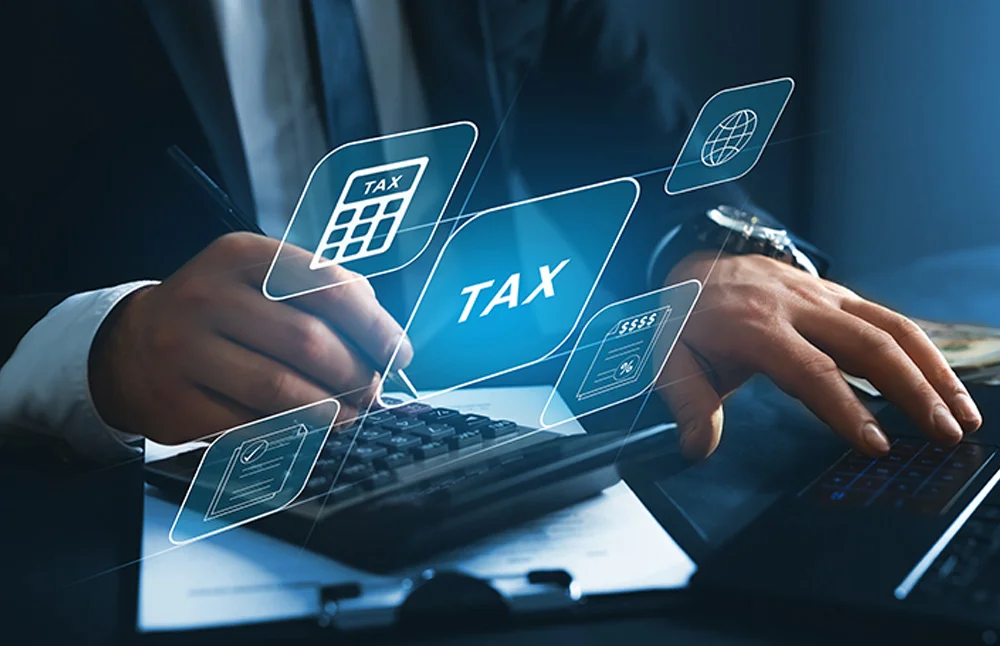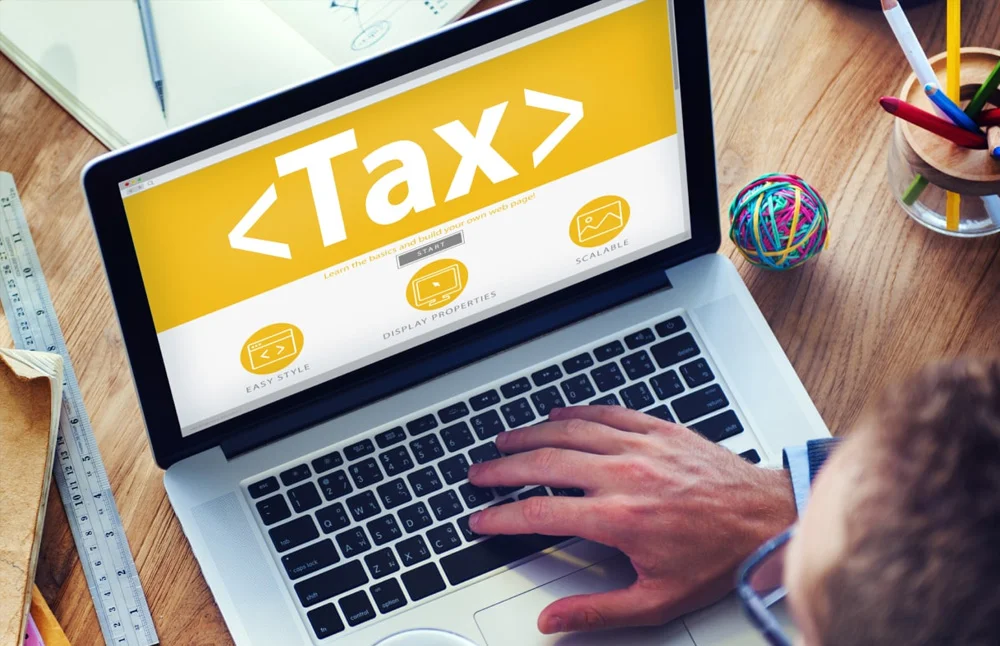An innovative solution for businesses to transform their outdated strategies for maximized financial growth & effective tax management. Leveraging modern technology: our remote tax services allow taxpayers to conveniently and securely file taxes from the comfort of their homes or offices. Gone are the days of rushing to a tax professional or spending hours waiting in long queues to file your taxes. With Accounting Accumen, all it takes is an internet-connected device to seamlessly connect with our certified tax experts, who can provide personalized assistance throughout the process.
Remote tax services are revolutionizing the way people & businesses manage their taxes. With a deep understanding of local and international tax regulations, our experts meticulously analyze your financial records and transactions, ensuring the utmost accuracy & compliance with applicable laws. Whether you need assistance filing personal income taxes or require complex corporate taxation solutions, our remote tax services entail a wide range of offerings tailored to your needs. Our services also include strategic tax planning, long-term tax strategy, wealth preservation, retirement tax services & much more.


The new-age technology has allowed for an efficient and streamlined tax process that offers numerous benefits to businesses, both big and small. Let us look into some of our tax benefits.
Ease of access – Gone are the days of long drives or tedious paperwork; now, business owners can access online platforms to fill out forms, submit necessary documents, & communicate with our tax experts remotely. With Accounting Accumen, all data can be easily uploaded onto a secure platform – making it especially advantageous for global enterprises or those operating in multiple locations.
Enhanced efficiency – Remote tax services eliminate waiting times & allow for real-time collaboration between professionals working remotely on different aspects of taxation, thereby improving efficiency while maintaining accuracy. Our services equipped with AI tools – help analyze financial data accurately & deliver valuable insights into potential deductions or loopholes that could reduce tax liabilities legally.
User-friendly interfaces – The user-friendly interfaces and intuitive features guide users throughout the process, ensuring accuracy and ease of use even for those without expertise in tax matters. It eliminates potential errors caused by manual data entry or complex calculations that can result in penalties or audits.
Mistakes minimized – Virtual tax services typically have built-in error-checking mechanisms that lessen errors on returns and filings. The software automatically verifies data input against established rules to identify discrepancies or incomplete information before submission to tax authorities. This proactive feature saves time by avoiding delays due to rejected filings while mitigating risks associated with erroneous reports.
Access to unlimited resources – Utilizing online tax services provides businesses access to a wide range of resources such as up-to-date regulatory changes and downloadable templates tailored specifically for different filing requirements across various jurisdictions. Businesses, no longer need to struggle to decipher complicated legislation themselves; instead, they can rely on our expertise which always ensures compliance with relevant laws.
Finding the best outsourcing partner for remote tax services is crucial for businesses to alleviate their workload and ensure compliance with ever-evolving tax regulations. Such partnerships play a huge role in maximizing efficiency while minimizing costs. At Accounting Accumen, we have expertise in various aspects of taxation, including income tax preparation, sales tax management, payroll taxes, and more. We offer seamless integration with existing systems to handle all financial data remotely. We are a reputable virtual tax service provider that prioritizes data security. By employing robust encryption protocols; we protect confidential data during transmission or storage. Moreover, our highly skilled professionals stay updated on current industry practices and regulatory changes. By selecting Accounting Accumen, businesses can streamline operations efficiently while ensuring full compliance with taxation requirements within budgetary constraints.










If you work from home, you could get some sizable deductions. Do you have a home office for exclusively business purposes? If so, you might be able to get a deduction for home-related expenses like property taxes. Travel or meal expenses might also qualify for deductions if you incur these expenses as part of your job. Don’t hesitate to reach out to PreciStat to learn more!
Tax deductions reduce the amount of taxable income you have. For example, suppose you make $50,000 per year, which places you in the 22% tax bracket. A standard tax deduction of $12,000 would reduce your taxable income to $38,000. As a result, you would only be taxed on that amount. You might use itemized deductions instead, but the effect is the same. Your taxable income would decrease. On the flip side, a tax credit reduces the amount of money you owe in taxes. So, if you get a tax credit of $1,000, you will pay the IRS $1,000 less.
If you want more answers to your Frequently Asked Questions (FAQs), Call PreciStat (xxx) xxx-xxxx
The IRS lists five different types of business taxes, as indicated below. Not all business owners will have to pay every type of business tax, though! The business taxes you pay will depend on the type of business you run.
Types of taxes
Income Tax:
Since you operate a business, you will need to file an income tax return on behalf of your business. In this case, the business’ “income” is the profit it has accrued throughout the year. As a business owner, you must pay taxes on that profit. You can subtract any deductible expenses first, though! The level at which the tax liability rests and how income tax is assessed depends upon the type of business you operate (sole proprietorship, single member LLC, partnership, S Corporation, or C Corporation).
Estimated Tax:
Employees have money withheld from each of their paychecks for tax purposes. But if you’re a business owner, you’ll have to pay regular income taxes throughout the year. To do this, you’ll file an estimated tax form at quarterly intervals. This form will account for both business and personal income, as well as self-employment taxes.
Self-Employment Tax:
Do you earn more than $400 per year by working for yourself? If so, then you may have to pay a self-employment tax. This tax goes toward your social security and Medicare coverage.
Employment Taxes:
If you have employees, you’ll need to pay certain employment taxes. These include Social Security and Medicare taxes, half of which you withhold from your employees’ paychecks and the other half of which you pay as the employer. These taxes also include federal unemployment taxes, which you must pay yourself.
Excise Tax:
If you professionally gamble or sell products like fuel, cigarettes, or alcohol, you may have to pay excise taxes.
Additionally, some states may require business owners to pay sales tax, property tax, litter tax, tire tax, gross receipts tax, franchise taxes or dividend tax. Again, the taxes you owe will depend on the type of business you own and the state of your business license.
If you can’t pay your business taxes by the appropriate due date, you’ll incur some penalties and fees. However, the IRS does offer a variety of payment options. First, make sure to pay as much as you can by the due date. Then, you may be able to request a 120-day extension. If you get this extension, you’ll still have to pay the necessary interest. You can also try to set up an installment plan to pay the rest of your taxes, or pay a fee to use a credit card.



Even if you don’t own a business, there are many types of receipts you should keep for tax purposes. You should keep receipts of medical expenses, for example, as well as for childcare. Depending on your circumstances, there may be numerous receipts that will help you get the best deductions.
If you work from home, you could get some sizable deductions. Do you have a home office for exclusively business purposes? If so, you might be able to get a deduction for home-related expenses like property taxes. Travel or meal expenses might also qualify for deductions if you incur these expenses as part of your job. Don’t hesitate to reach out to PreciStat to learn more!
Tax deductions reduce the amount of taxable income you have. For example, suppose you make $50,000 per year, which places you in the 22% tax bracket. A standard tax deduction of $12,000 would reduce your taxable income to $38,000. As a result, you would only be taxed on that amount. You might use itemized deductions instead, but the effect is the same. Your taxable income would decrease. On the flip side, a tax credit reduces the amount of money you owe in taxes. So, if you get a tax credit of $1,000, you will pay the IRS $1,000 less.
If you want more answers to your Frequently Asked Questions (FAQs), Call PreciStat (xxx) xxx-xxxx
The IRS lists five different types of business taxes, as indicated below. Not all business owners will have to pay every type of business tax, though! The business taxes you pay will depend on the type of business you run.
Types of taxes
Income Tax:
Since you operate a business, you will need to file an income tax return on behalf of your business. In this case, the business’ “income” is the profit it has accrued throughout the year. As a business owner, you must pay taxes on that profit. You can subtract any deductible expenses first, though! The level at which the tax liability rests and how income tax is assessed depends upon the type of business you operate (sole proprietorship, single member LLC, partnership, S Corporation, or C Corporation).
Estimated Tax:
Employees have money withheld from each of their paychecks for tax purposes. But if you’re a business owner, you’ll have to pay regular income taxes throughout the year. To do this, you’ll file an estimated tax form at quarterly intervals. This form will account for both business and personal income, as well as self-employment taxes.
Self-Employment Tax:
Do you earn more than $400 per year by working for yourself? If so, then you may have to pay a self-employment tax. This tax goes toward your social security and Medicare coverage.
Employment Taxes:
If you have employees, you’ll need to pay certain employment taxes. These include Social Security and Medicare taxes, half of which you withhold from your employees’ paychecks and the other half of which you pay as the employer. These taxes also include federal unemployment taxes, which you must pay yourself.
Excise Tax:
If you professionally gamble or sell products like fuel, cigarettes, or alcohol, you may have to pay excise taxes.
Additionally, some states may require business owners to pay sales tax, property tax, litter tax, tire tax, gross receipts tax, franchise taxes or dividend tax. Again, the taxes you owe will depend on the type of business you own and the state of your business license.
If you can’t pay your business taxes by the appropriate due date, you’ll incur some penalties and fees. However, the IRS does offer a variety of payment options. First, make sure to pay as much as you can by the due date. Then, you may be able to request a 120-day extension. If you get this extension, you’ll still have to pay the necessary interest. You can also try to set up an installment plan to pay the rest of your taxes, or pay a fee to use a credit card.

sunny@accountingaccumen.com
+1 310 734 5519
+1 863 223 2030
